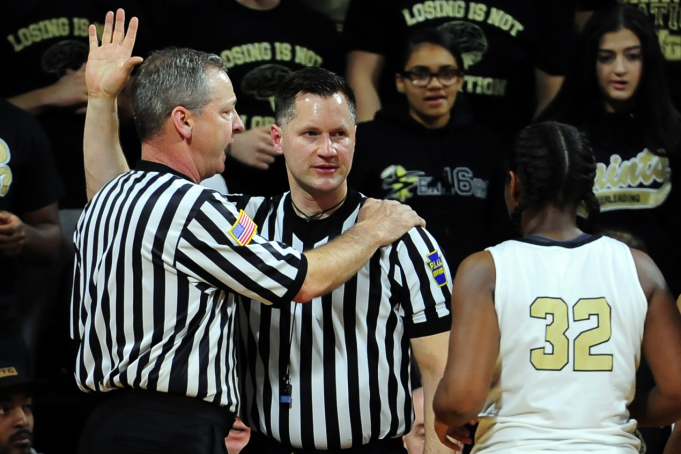All officials have their first game at one time or another. We have heard stories of the officiating greats and how they got their start. Many have worked youth leagues or church programs for something like $10 a game. Some of them come from other sports. No matter where they got their opportunity, they have all worked hard to get to this point of their officiating career.
Organizations throughout the world have their yearly cadet group or applicant class. A bulk of the training sessions for these new recruits are dedicated to tedious rules study and passing the certification exam. It can be quite overwhelming for a potential official to wrap his or her head around the intricacies of the rules.
Passing the exam is just the beginning. Learning court coverage, mechanics and signals should be the next step, along with getting on the court for scrimmages and exhibition games. Next is getting acquainted with the assigner and the assigning website, managing your full-time job with your new avocation, arranging your travel plans and learning all the sites where the games are being played.
The first year of officiating is often a blur and almost seems to be a new start with each game. It is surely a relief to get a game assignment with a veteran official and a leader of the organization.
As an experienced official, there are several things you can do to make the first-year official feel comfortable. With the newer official at ease, the crew can enjoy the game, be more confident as a unit and put its best effort forward for the good of the game.
Remember to be humble and understanding.
Put yourself in your partner’s shoes and try to remember how you felt when you first started. The new official may initially be impressed with your experience or your schedule but quite frankly it is not relevant to the game for that day. The only contest that counts is the one you are about to officiate. Unpretentiously use your vast experience to assist the official with his or her comfort level and confidence. Show you are there to help and you can be relied upon for aid for the duration of that day.
As far as the pregame conversation, do not make it too complex — you can make it an easy conversation and include the new official in the discussion. Let the official know you will help on the court as much as possible if there is an abnormal or layered play.
Allow the rookie to handle responsibilities.
Let rookies handle pregame tasks like reviewing the official scorer’s book before the 10-minute mark and performing the toss at the beginning of the game. This will help to relieve the new official’s nerves by focusing on these duties. Once the game starts, continue to build the new official’s confidence by making eye contact and checking in often. Give encouraging compliments and remember the official might be very nervous. Now is not the time to worry about minute details. Focus on the big picture and offer advice on a few things the official can work on immediately.
Be attentive to times when the official needs your help or assistance.
Do not try to show a rookie up by dominating the game with your calls or showing you are the experienced one. There will be times when your experience will dictate rulings on the court. Other times simply letting that official accept the consequences of an incorrect call (or incorrect no-call) can serve as a learning moment, without breaking confidence or bringing down the competitiveness of the game.
Use proper rulings and signals.
Stick to the approved rules and policies of your local association or conference. This is not the time to brag that you are a college or professional official by showing off conflicting mechanics or signals. The new official is going to only know what was taught by the interpreter or trainer of this chapter or group. It can be confusing or frustrating to the new official who may second guess these things or become unsettled.
Be available.
Be open to a follow-up or continuous conversation after the game and throughout the season. Feel free to check in with that official by sending an email or a text. Offer to lend an ear on future situations or to review some rules/mechanics after the initial high of the game is over and you are removed from the gameday setting. It behooves both parties since you will most likely be working with each other in the future and you want to continue the officiating partnership.
Meet before and/or after the game.
Offer to pick up that new official and travel to the game together. This way you can spend extra time talking about the game. To the new person, it is comforting to have that veteran to bond with prior to the game and to walk into the facility with as a colleague. If time allows, you can plan to meet for a bite to eat after the game to review the game and to gauge how the new official feels. This time can be used to further drive home the important points of the game and to be available for questions about specific plays.
It should be said that a “rookie” official is not only a new official, but can be a first-year official on a new collegiate conference staff or in another league. Regardless of the case, that new official is already preoccupied with doing the best job he or she can do and wants to get off to a good start. Remember, we were all once the “rookie.” To make rookies feel comfortable, relate to their situation and be an understanding and patient crew member.
What's Your Call? Leave a Comment:
Note: This article is archival in nature. Rules, interpretations, mechanics, philosophies and other information may or may not be correct for the current year.
This article is the copyright of ©Referee Enterprises, Inc., and may not be republished in whole or in part online, in print or in any capacity without expressed written permission from Referee. The article is made available for educational use by individuals.
















